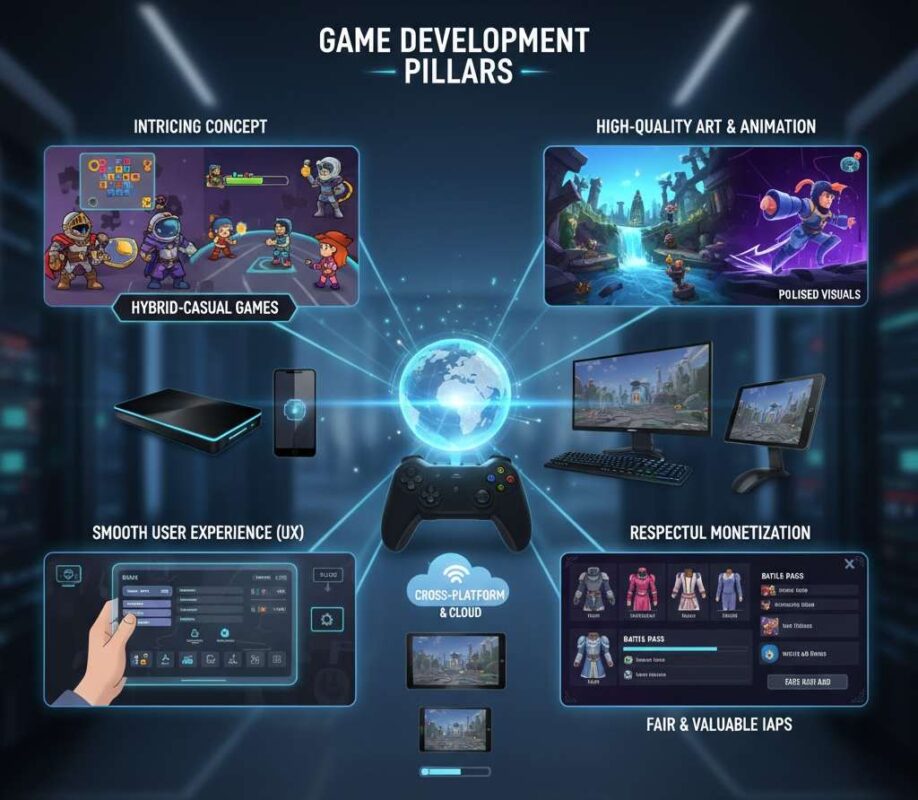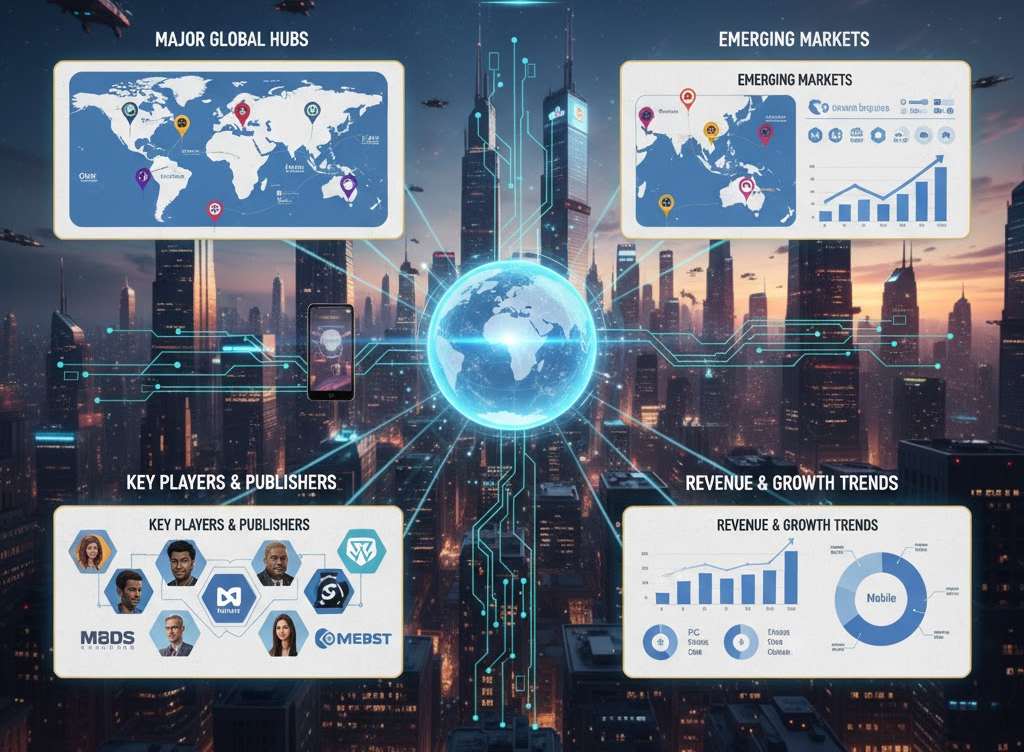Mobile Game Development in 2025: What It Takes to Create a Hit Game

Mobile gaming has rapidly evolved from a mere pastime into an international entertainment powerhouse over the past decade. While 2D puzzlers and endless runners once dominated, today, our smartphones provide us with access to vast cinematic worlds with intricate narratives and console-quality graphics. Testaments of this incredible evolution are evident by 2025’s estimated mobile gaming industry revenue of $110 billion, boasting an estimated player base exceeding 3.5 billion and average weekly play times exceeding 10 hours! For game development companies today, this presents vast opportunities.
However, this growth has spurred unprecedented competition. Player expectations have skyrocketed, and the standard for what constitutes a hit mobile game is higher than ever; no longer is simply having a fun concept sufficient; success requires creating an immersive, compelling, and deeply engaging experience capable of drawing in new players and keeping existing fans. This post will explore recent mobile game trends while outlining exactly what a game development company must do to launch and sustain an engaging mobile title in today’s changing marketplace.
What Defines a Successful Mobile Game in 2025?
Definitions of success have evolved beyond simply download numbers. While making your game available to millions of devices is a fantastic first step, true mobile game success lies in metrics demonstrating long-term health and profitability – success today is a multidimensional accomplishment!
Retention rates, community engagement, effective monetization that feels fair to players, and fair revenue models all factor into creating a hit game. Genshin Impact and MONOPOLY GO! both demonstrate this. Key success metrics for mobile game development company include high daily active users (DAUs), substantial average revenue per user (ARPU), and long-term player value as benchmarks of success.
Key Pillars of Successful Mobile Game Development

Using a chart-topper requires a practical strategic approach centered on key pillars; neglect could thwart even the grandest ambitions of game development companies.
Your Game Needs an Intriguing Concept
Your game needs an intriguing concept to draw players in. This could include something as simple as an engaging gameplay loop or as complex as character progression or competitive modes that are captivating for players. The 2025 market is witnessing an explosion of hybrid-casual games combining casual game mechanics with deeper mid-core systems like character progression or competitive modes; such titles attract large audiences while keeping them engaged for extended play sessions. Partnering with an innovative mobile game development company will ensure your concept stands out in this crowded field.
Art and Animation in High-Quality Format
Visuals are often the first impression a player gets of any game they come across, and making an unforgettable first impression requires striking art styles and fluid animation. A powerful first impression and standing out in an overcrowded marketplace requires polished visuals from stylized 2D art, immersive 3D environments, or slick motion design that are polished and consistent across platforms and devices – this ensures players invest their time and attention in enjoying your product! High-quality artwork enhances this experience for players while convincing them that investing their time will pay off in spades!
Smooth User Experience (UX)
Poor user experiences can quickly ruin an otherwise spectacular game. Players in 2025 expect fast loading times, intuitive controls, and uncluttered menus; their experience must also be optimized across devices ranging from high-end flagships to budget models; accessibility features such as colorblind modes or customizable controls must ensure everyone can play your game without interruption.
Monetization Strategies That Respect Players
How you make money is just as critical to the game itself. Although free-to-play games are still widely enjoyed, many players have grown cautious of unfair “pay-to-win” features. Successful mobile game monetization strategies should focus on providing real value – this may involve IAPs for cosmetic items or convenience purchases; rewards for watching ads; or providing access to content through battle passes – the key is developing an equitable system that honors players’ investments of time or money.
Cross-Platform Play and Cloud Integration
The lines between mobile, PC, and console gaming are becoming increasingly blurry. More studios are adopting cross-platform play, enabling users to enjoy the same game across devices – phone, tablet, computer, or console – without losing progress synchronized between each platform. This increases your potential audience while providing greater flexibility to players. Cloud gaming is also growing increasingly popular as it allows developers to stream graphically intensive experiences onto less capable devices without any decrease in performance.
Tools and Technologies Powering 2025’s Mobile Games

An effective technology stack enables developers to bring their creative visions more efficiently than ever. Leading game engines like Unity and Unreal Engine 5 continue to be popular choices for creating stunning graphics and complex gameplay. Still, open-source engines such as Godot and lightweight frameworks such as Cocos Creator are growing popular among indie developers and ambitious game development companies seeking cost-cutting without compromising quality.
Artificial Intelligence has rapidly evolved from an abstract concept into an effective tool in game development. AI is being utilized to generate dynamic levels, simulate more realistic NPC behaviors, and help balance game mechanics. Furthermore, we’re seeing increased use of Augmented Reality (AR) for immersive, location-based experiences while Virtual Reality (VR) on mobile phones remains a niche but growing area; finally, blockchain and NFTs’ role has gradually receded as developers prioritize gameplay value over speculative tech.
Establish a Skilled Mobile Game Development Team
Behind every successful mobile game is a talented and cohesive team of developers. A typical development team includes game designers for crafting the core experience, programmers writing code, artists/animators/animators creating visuals/animators animators creating animations/sound engineers creating audio. Testers ensure quality assurance while marketers generate buzz driving downloads—working with an experienced mobile game development company gives you access to this vast talent under one roof.
Remote collaboration has become the norm, enabling studios to draw talent from a global talent pool. Outsourcing specific tasks, like art or sound design creation or sound design production, is another common strategy employed by both indie teams and large studios alike to reduce costs while accessing specialist skills more cost effectively. This approach gives smaller development companies an edge by remaining lean and concentrating resources on their game strengths rather than being drawn into expensive labor costs associated with traditional studio models.
Marketing and Launch Strategies
Game development is only half the battle; getting your game noticed requires an effective marketing and launch strategy. A soft launch in smaller markets is essential, providing the opportunity to gather player feedback, test servers, and optimize monetization models before rolling out globally.
Influencer marketing in 2025 is an absolute necessity. Partnering with streamers and content creators on platforms like TikTok and YouTube to introduce your game to millions of potential players is crucial, while strong App Store Optimization (ASO) should also be applied: using appropriate keywords, designing an eye-catching icon, and showing compelling screenshots will significantly boost visibility for your game on App Stores like the Play Store. Creating a community via platforms such as Discord and Reddit before releasing can create a dedicated fanbase ready to back your game from day 1.
Post-Launch Success: Retention and Updates
Launching your game is only the first step; long-term success relies on keeping players engaged through regular updates, seasonal events, and limited-time modes that keep players returning for more. These activities give them something they look forward to when coming back!
Integrating gamification elements, like daily rewards and loyalty programs, into your game development company can increase retention. You must listen to your players, use analytics to better understand player behavior, actively seek community feedback to make meaningful improvements, and listen to how the audience wants their game developed over time—this ensures long-term success! Game development companies must stay connected to player needs and trends as players evolve.
Future Outlook for Mobile Game Development: What Lies Ahead
Looking ahead, mobile gaming will continue to change and evolve rapidly. By 2026 and beyond, we can expect AI-powered personalization to become even more sophisticated, adapting stories and difficulties according to individual play styles. Subscription-based models like Apple Arcade or Netflix could become more prevalent as an alternative to free-to-play. Wearable technology, such as smartwatches and AR glasses, could become further integrated for interactive entertainment, with forward-thinking mobile game development company teams leading this next-gen experience development.
Conclusion
Creating a hit mobile game in 2025 is no easy feat, yet far from impossible. Success requires not just an innovative idea but also understanding player expectations, prioritizing quality over speed during development, and devising an effective launch and expansion plan. By focusing on unique concepts with polished execution that focus on user-centric designs, you can build something that not only climbs the charts but also captures players’ hearts around the globe – partnering with an expert game development company will enable your vision for an acclaimed mobile title to come to fruition!
References
- Newzoo. Global Games Market Report 2025.
- Statista. Mobile Gaming Industry Revenue and User Statistics 2025.
- App Annie (Data.ai). State of Mobile Gaming Report 2024.
- Unity Technologies. Gaming Report: Trends and Insights 2025.
- Sensor Tower. Mobile Game Market Analysis 2024–2025.
- PwC. Global Entertainment & Media Outlook 2024–2028.
- Google & Newzoo. Mobile Gaming Trends in APAC 2025.
- Apple App Store & Google Play Store Data Reports. Top-Grossing Mobile Games 2025.
- GDC (Game Developers Conference). State of the Game Industry Report 2025.
- Deloitte. The Future of Gaming: Mobile, Cloud, and Beyond 2025.
